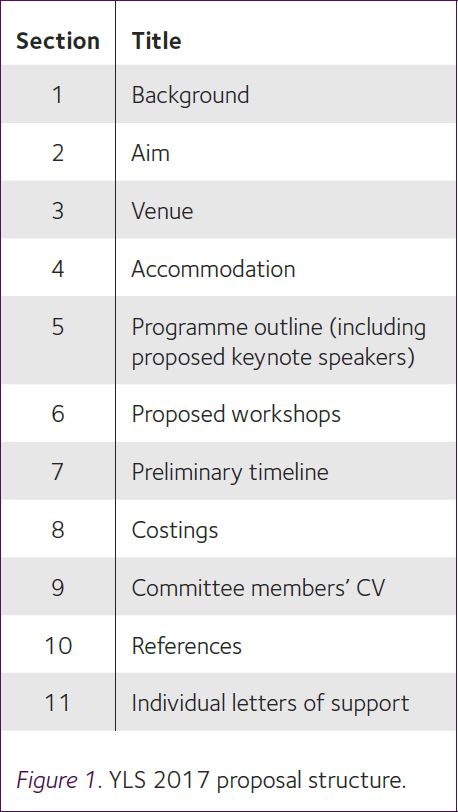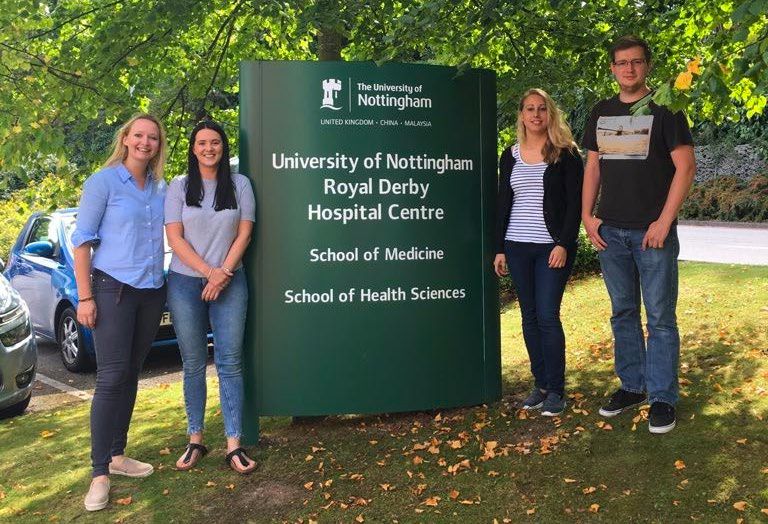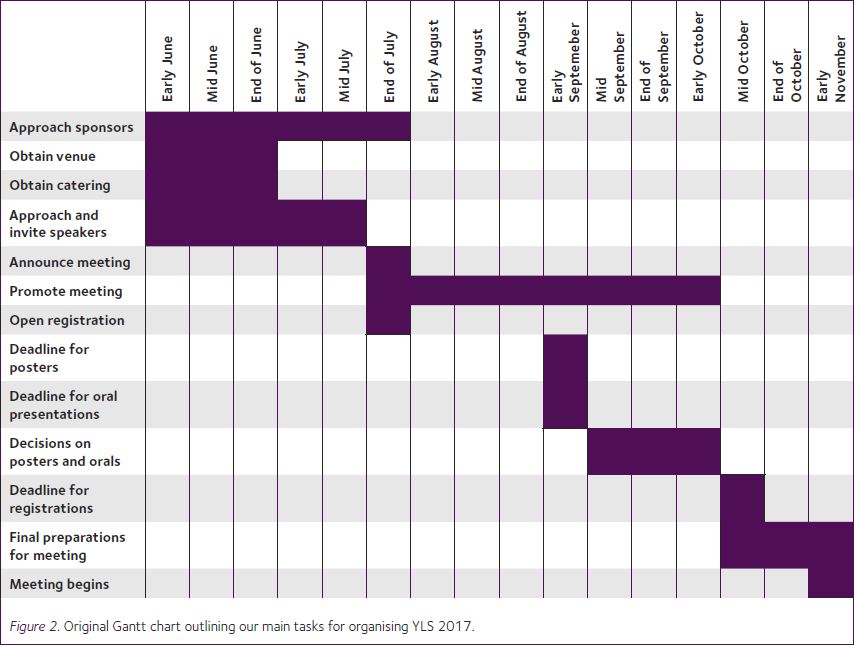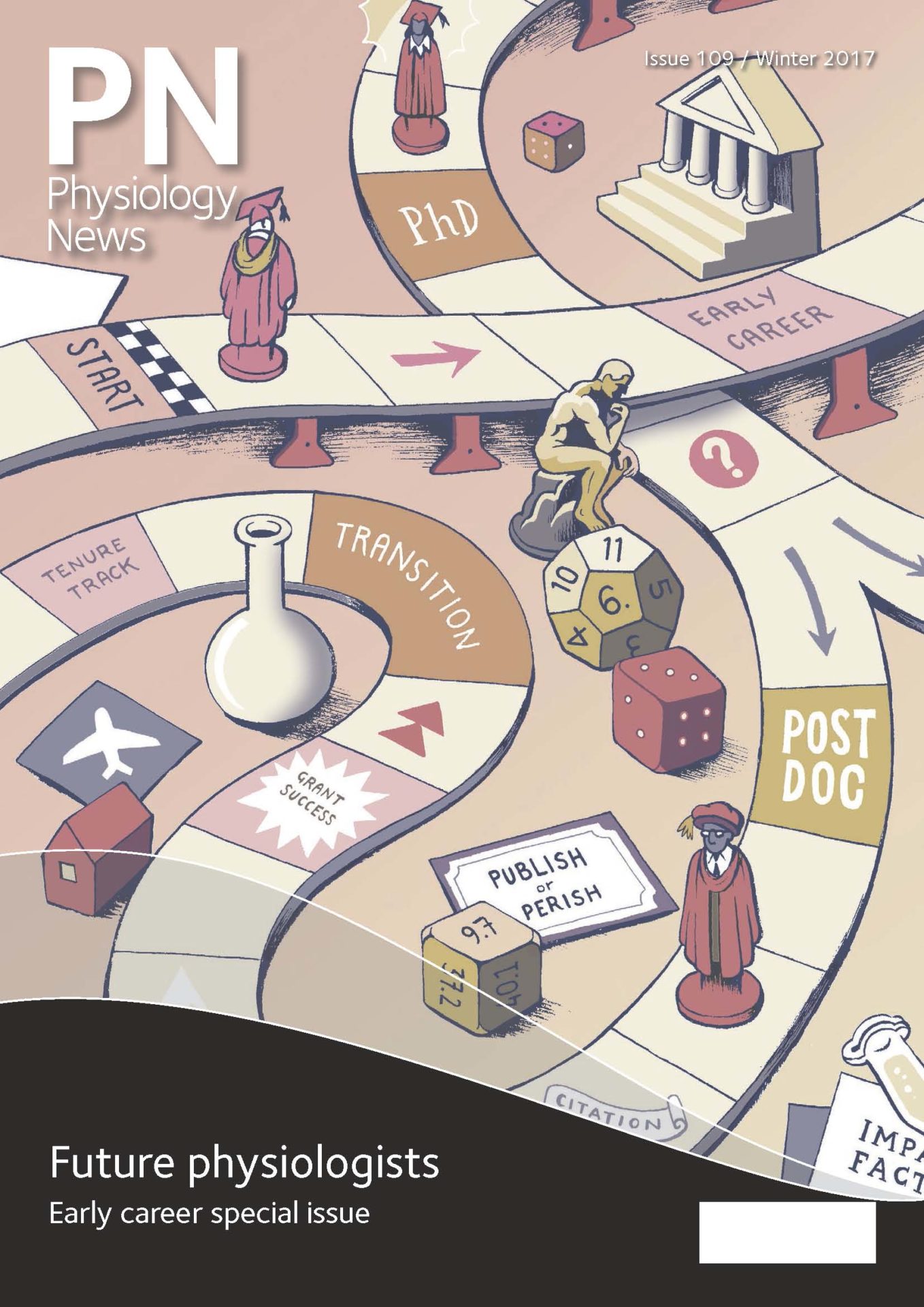
Physiology News Magazine
YLS 2017: planning your first symposium – a pilot study
Events
YLS 2017: planning your first symposium – a pilot study
Events
Colleen Deane
Department of Sport and Health Sciences, College of Life and Environmental Sciences, University of Exeter, UK
Amelia Pollard & Jessica Cegielski
MRC-ARUK Centre for Musculoskeletal Ageing Research, Clinical, Metabolic and Molecular Physiology, University of Nottingham, Royal Derby Hospital, Derby, UK
Joseph Bass
Faculty of Education & Health Sciences, University of Limerick, Ireland
https://doi.org/10.36866/pn.109.16
25 November 2017
MRC-ARUK Centre for Musculoskeletal Ageing Research, Royal Derby Hospital, Derby, UK
www.yls2017.co.uk
Scientific symposia are designed to enhance scientific understanding, encourage the exploration of novel ideas, develop presentation skills and facilitate networking. It is therefore important that regular conferences are organised, particularly for postgraduates and early career researchers to support their career development.
The aim of this article is to describe the processes that were applied to plan the Young Life Scientists’ symposium 2017 (YLS 2017) and highlight the key points to consider when planning a similar event.
Method
Four (26.4±0.6y, 3:1 female:male, (mean±SEM)) PhD students and postdoctoral researchers (pictured below) collaborated on the YLS 2017 proposal. All members provided verbal consent to take part in the YLS project. Written consent was provided on behalf of the supervisor through their letters of support.
Initially, meetings were held to discuss a potential: 1) scientific theme, 2) programme and 3) date and location. Sections of the proposal were delegated to each committee member to write. The proposal structure can be seen in Figure 1.
After confirmation that our application was successful, regular committee meetings were required to ensure the outlined proposal was delivered. Additional aspects had to be added such as creating and continually updating a website and social media pages, setting up a project code for finance, risk assessments, health and safety meetings and gathering external sponsorship. A Gantt chart (See Figure 2) was used to ensure the most significant tasks (p<0.05) for the meeting were kept to time.


Results
The most important considerations for organising a symposium are:
- Select a diligent organising committee
Organising a symposium is very demanding, with some of the tasks being unfamiliar and requiring additional training. The committee was made up of four diligent individuals, all from different undergraduate backgrounds; thus, the collective skills and interests were similar, but also contained unique attributes. Additionally, the collaboration across three different institutions provided greater interest in the event since it was promoted through three universities. - Allow plenty of time to organise the symposium
Planning a symposium during an early career stage means that a lot of the tasks are unfamiliar and, therefore, thorough planning should be undertaken early on. Importantly, reserving the venue, confirming the speakers and announcing the symposium should occur as a priority, so that the venue and speakers are guaranteed. Furthermore, having these confirmed initially aids approaching sponsors for additional funding. An important aspect that was collectively designed was a Gantt chart with all the key planning milestones as a reference for progress. Planning began in June, allowing ~five and a half months to organise the whole symposium. - Organise a great scientific programme
Many things make a great scientific programme including the keynote speakers, the topic of the symposium and the relevance of the workshops. When planning the programme, it is important to consider the target audience of the symposium and organise sessions accordingly so that they will be of interest and benefit to those attending. Therefore, keynote speakers should be selected foremost based on the relevance of their research to the symposium. Speakers that are world-renowned and well-respected will entice the scientific community to attend the conference. For YLS 2017, eminent academics were chosen. It was important to host keynote speakers that would encourage and initiate interactions between students and researchers alike, developing future collaborative links. In addition to keynote presentations, workshops were also included in the YLS 2017 programme. Workshops titled ‘Life Post PhD’ and ‘Successful Grant Applications’, aimed specifically at postgraduate students and early career researchers, were selected. The workshop ‘Life Post PhD’ highlighted the variety of scientific career routes after a PhD that are available to postgraduates in addition to careers within academia. For this session, three speakers were invited, all of whom have chosen a different route after their PhD, to discuss their current role and how they secured that position. Showcasing the different career options post-PhD particularly appealed to the postgraduate delegates. The parallel workshop ‘Successful Grant Applications’ was chosen to support professional development given the limited training during PhD programmes; this workshop enabled early career researchers to gain tips from the experts. - Provide informal opportunities for networking
Networking is one of the key reasons researchers attend conferences. Therefore, it was essential the programme included plenty of coffee breaks (i.e. during poster sessions) so that networking could happen. Additionally, an evening meal was arranged, which was heavily subsidised by obtaining external funding, so that delegates could continue the discussion of their ideas into the evening and have some delicious food.
Conclusion
Organising a symposium as a postgraduate or postdoctoral researcher is a fantastic, eye-opening experience. For those thinking of applying to host further YLS symposiums, the best advice is: be prepared for the hard work, and enjoy it!

